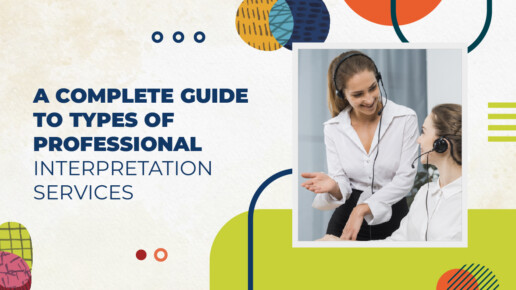A Complete Guide to Types of Professional Interpretation Services
Interpretation Services have become increasingly vital in our globalized world, where effective communication across language barriers is essential. Whether in business, healthcare, legal, or other fields, accurate interpretation is crucial for facilitating understanding and fostering meaningful interactions. In this comprehensive guide, Metaphrasis will explore the different types of professional interpretation services available and delve into their significance in various contexts.
Introduction to Interpretation Services
Interpretation services involve the transfer of spoken or signed language from one language to another, ensuring effective communication between individuals who do not share a common language. These services play a pivotal role in overcoming language barriers, enabling smooth interactions and preventing misunderstandings.
- Types of Interpretation Services
2.1 On-Site Interpreting
On-Site Interpreting involves the presence of an interpreter at the physical location where communication is taking place. This type of interpretation is commonly used in conferences, business meetings, legal proceedings, and medical appointments. On-site interpreters offer real-time interpretation, conveying the speaker’s message accurately and maintaining the nuances of language and cultural context.
2.2 Over the Phone Interpreting
Over the Phone Interpreting (OPI) allows individuals to connect with interpreters remotely via telephone. OPI offers convenience and flexibility, making it suitable for scenarios where immediate interpretation is required. This service is often utilized in customer support, emergency situations, and ad-hoc language needs. Over the Phone Interpreting enables rapid access to interpreters, facilitating effective communication even in time-sensitive situations.
2.3 Video Remote Interpretation
Video Remote Interpretation (VRI) combines the benefits of on-site interpreting and over the phone interpreting. VRI utilizes video conferencing technology to connect individuals with interpreters visually. This type of interpretation service is particularly useful when non-verbal cues and facial expressions are crucial for effective communication. Video Remote Interpretation is increasingly being adopted in healthcare, legal, and educational settings.
- Specialized Interpretation Services
3.1 Conference Interpreters
Conference Interpreters are highly skilled professionals who specialize in simultaneous interpretation during large-scale events, conferences, and international meetings. We are possess expertise in conveying complex ideas and terminology accurately and efficiently. Conference interpreters play a pivotal role in bridging language gaps and enabling seamless communication between participants from different linguistic backgrounds.
3.2 Medical Interpreters
Medical Interpreters are trained professionals who facilitate communication between healthcare providers and patients who speak different languages. We are ensure accurate transmission of medical information, including diagnoses, treatment options, and consent discussions. Medical interpreters possess knowledge of medical terminology, cultural sensitivity, and adherence to patient confidentiality.
- Benefits of Professional Interpretation Services
Professional interpretation services offer numerous advantages in various professional settings:
4.1 Accurate and Effective Communication
Interpretation services ensure accurate and effective communication, minimizing misunderstandings that can arise due to language barriers. By providing real-time interpretation, interpreters enable clear and precise exchange of information, fostering understanding and collaboration.
4.2 Cultural and Linguistic Expertise
Interpreters possess in-depth knowledge of the source and target languages, as well as the cultural nuances associated with them. This expertise allows them to bridge not only the linguistic but also the cultural gaps, ensuring culturally appropriate and contextually sensitive communication.
4.3 Enhancing Business and Healthcare Interactions
Professional interpretation services contribute to the success of businesses by facilitating international partnerships, negotiations, and collaborations. In healthcare, interpretation services improve patient outcomes by ensuring accurate diagnosis, treatment adherence, and informed decision-making.
- Choosing the Right Interpretation Service Provider
Selecting a suitable interpretation service provider is crucial for ensuring quality and reliable services. Consider the following factors when choosing an interpretation service provider:
5.1 Assessing Language Requirements
Evaluate your language needs and ensure that the service provider offers interpreters proficient in the required languages. Verify their language qualifications and fluency to guarantee accurate interpretation.
5.2 Evaluating Interpreter Qualifications and Experience
Examine the qualifications, certifications, and experience of interpreters associated with the service provider. Look for specialized expertise in the relevant field, such as legal or medical interpretation.
5.3 Considering Technology and Accessibility
Assess the technological capabilities and accessibility options offered by the interpretation service provider. Consider factors such as availability of video remote interpretation, compatibility with different devices, and support for individuals with disabilities.
- Successful Implementation of Interpretation Services
Explore real-life examples where organizations have successfully implemented interpretation services to enhance their operations and communication. These case studies illustrate the benefits and positive outcomes achieved through the utilization of professional interpretation services.
- The Future of Interpretation Services
As technology continues to advance, interpretation services are also evolving. The future holds potential for further improvements and innovations in interpretation technology, including machine translation and artificial intelligence. However, challenges such as maintaining human connection and addressing privacy concerns will need to be addressed to ensure the seamless integration of technology in interpretation services.
- Conclusion
Professional interpretation services are crucial for effective communication in a multilingual world. By leveraging the expertise of interpreters and choosing the right service provider, businesses and organizations can overcome language barriers and foster meaningful interactions. As the global landscape continues to evolve, the demand for interpretation services will only increase, highlighting the importance of embracing and optimizing the available options.

